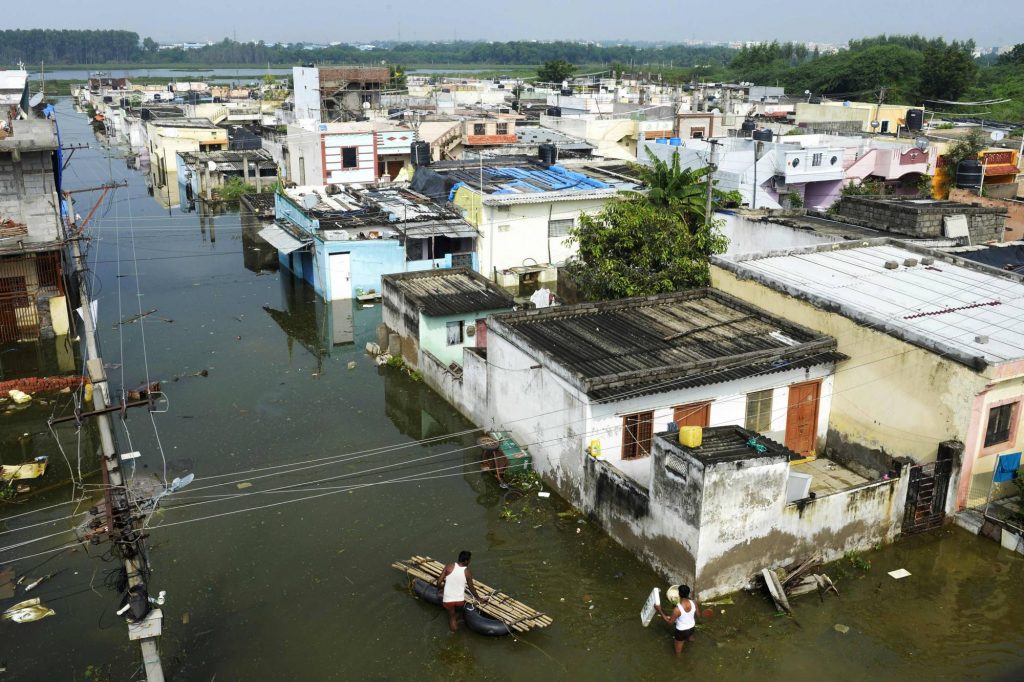The latest report of the Intergovernmental Panel for Climate Change (IPCC), a body of over 700 scientists across the world, paints a bleak future for the survival of humans and the health of planet Earth. Released February 27 by 195 member governments of the IPCC, it says scientific evidence unequivocally points to the fact that climate change is a real and no imaginary threat to human well-being and all forms of life on the planet. Various organisations working for the improvement of the climate, battered by human activities, have been warning developed and developing countries against their reckless use of industries and technology and urging them to drastically reduce carbon emissions to put a brake on greenhouse gas effects. But, the greed for maximising profits and the ruthless exploitation of natural resources have made a mockery of the concerns expressed by the scientific community. The latest damning report of the IPCC says any further delay in concerted global action means missing a brief and rapidly closing window to secure a ‘livable’ future. Human-induced climate change has been causing widespread disruption in nature and affecting the lives of billions of people around the world despite efforts to limit the damage. Now, the scientists say people and ecosystems least equipped to cope with the challenges in Asia, Africa, South and Central America and the Arctic region are being hardest hit. India will also have to witness intense impact of climate change which will drastically affect its agriculture, water resource and economy.
The IPCC report is a dire warning about the consequences of inaction. The report makes it clear that the world is confronted with certain climate hazards over the next two decades with global warming of 1.5 degree C. The earlier report did mention the problem, but now it sounds the alarm bell that even temporarily exceeding this warning level will produce additional severe impacts, some of which will be irreversible causing increased risks for society, including damage to infrastructure and low-lying coastal settlements. Climate change has brought acute food and water insecurity to millions of people, particularly in Africa, Asia, Central and South America. The report states that by the middle of this century, around 35 million people in India could face annual coastal flooding. India is also one of the countries most vulnerable to sea-level rise. India’s food production and security could be badly hit. The report also states that almost 40 per cent of India’s population will live with water scarcity by 2050.
The Ganges and the Brahmaputra river basins could also witness increased flooding if warming crosses 1.5 degree Celsius. All this shows the threat is real and must not be ignored if humanity is to survive. India has to be extra cautious since the country had a Net Zero commitment for 2070 in the COP26 meet. Notwithstanding lack of concrete steps in that direction, the target itself is too far away. There just isn’t enough time to linger. Tangible action is required now and not later.
The importance of the latest IPCC report – the second installment of the sixth assessment report (AR6) underscores the urgency of immediate and far more serious action to address climate risks. Half-hearted measures, which have characterised the strategy adopted by heads of government, are, according to the report, “no longer an option.” Nothing can be more unequivocal. However, the report offers new insights into nature’s potential to reduce climate risks and improve people’s lives. This is a significant departure from earlier reports as it holds out some hope for recovery, especially in urban centres which are thought to be one of the main culprits for the catastrophe being brought on the planet. By restoring degraded ecosystems and effectively conserving 30 to 50 per cent of the Earth’s land, freshwater and ocean habitats, human society can benefit from nature’s inbuilt capacity for absorbing and storing carbon. This will help humans accelerate progress towards sustainable development. The catch is that for these actions, massive finance and political support are needed. The scientists point out that climate change is accelerated by unsustainable use of natural resources, growing urbanisation, social inequalities, losses and damage from extreme events and a pandemic. Their assessment is that tackling all these challenges means concerted actions by governments, private sector and civil society. Only by bringing together technological knowhow and indigenous and local knowledge can effective solutions be found. Failure to achieve climate resilient and sustainable development will cause irreparable damage to the planet and hasten environmental catastrophe. Time is indeed running out and any dillydallying by governments which have the resources to play a crucial role in the fight will be to their peril as well as the entire human species.
